The GCC DAYS IN JAPAN held in Tokyo April 22-24, 2015
Summary report by Ikuzo Kobayashi, President of Salaam Association
From the Summer issue of the electronic Salaam Quarterly Bulletin, No.14, May 2015
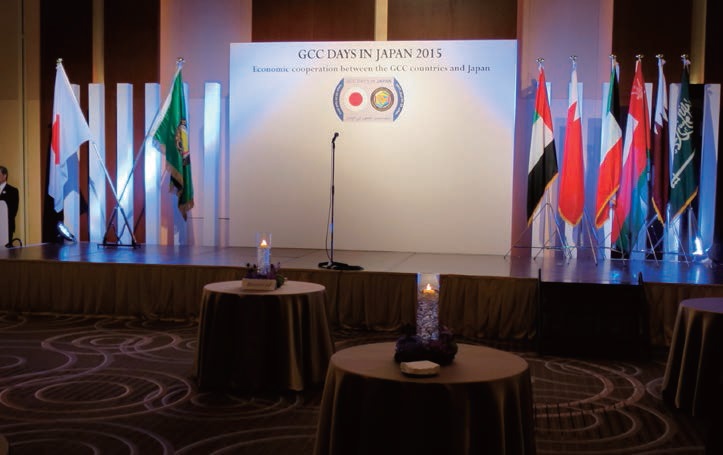
Reception at Conrad Tokyo, on April 22, 2015
The Cooperation Council for the Arab States of the Gulf (GCC) has held the GCC Days conference annually since the first such conference in Paris in 2004. The conferences have been held mainly in Europe for the past 10 years, but the 10th conference was held in Tokyo, Japan. Representing the sponsor, Mr. Kharid Al-Ghassani of the GCC greeted the participants, saying, “The GCC member countries (six Gulf countries) are united and aim at building a good relationship with the host country through the conference.”
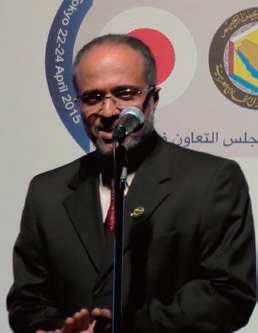
Host address by His Excellency Mr. Kharid Al-Ghassani of GCC
Assistant Secretary-General for Culture & Information Affairs
The theme of the first day of the conference was “Economic cooperation between the GCC countries and Japan (Current status and future expectation).”
The theme of the second day was “Promoting bilateral relations and understanding between the GCC and Japan.”
The theme of the third day was “Media cooperation between the GCC and Japan.”
In the past, the relationship between the GCC member countries and Japan was predominantly economic and governmental. The main challenges this time are diversification of the exchanges in education, culture and media and expansion of private-sector exchanges. The sessions were divided to cover all those challenges and representatives of the GCC and Japan made presentations on those themes. Moderators were chosen to facilitate discussion in those sessions to deepen mutual understanding.
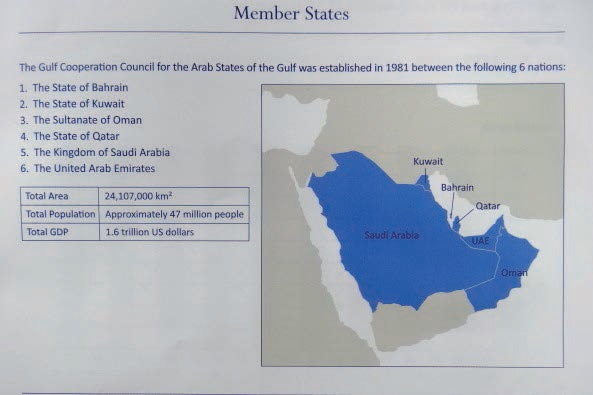
The GCC Member States
Report from the participants in the first day
Mr. Kharid Al-Ghassani, Assistant Secretary General for Culture and Information Affairs of the GCC gave greeting remarks representing the sponsor.
Next, Mr. Nobuaki Ito, Deputy Director-General for International Trade Policy, Ministry of Economy, Trade and Industry (left photo above), made a welcoming speech, opening the conference.
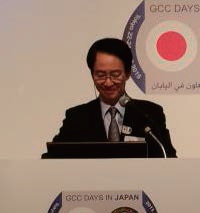
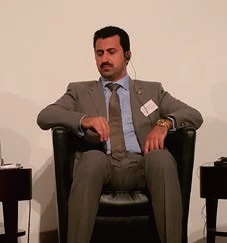
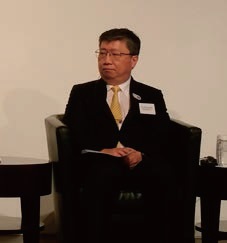
The sessions adopted four themes including: (1) Current state of economic cooperation between the GCC countries and Japan and the ways to promote it, (2) Exchange of scientific and practical industrial expertise between Japan and the GCC countries, (3) Investment cooperation in the GCC countries, and (4) Alternative energy. In each session, a GCC representative and a Japanese representative made presentations. Regarding themes (3) and (4), discussions were held after presentations to deepen mutual understanding. (In session 1, Mr. Sheikh Nemr Fahad Al-Sabah (center photo above), Assistant Undersecretary for the International Organizations Affairs and Foreign Trade, Ministry of Commerce and Industry of Kuwait, gave a speech.
The main activities in the economic cooperation between the GCC countries and Japan are Japan’s import of energy resources including oil and natural gas and the GCC’s import of industrial goods including automobile and machine products. Especially in the trade of energy resources, Japan is importing 80% of crude oil and 30% of natural gas from the GCC. Japan’s export is promoted in response to the GCC’s desire to decrease its dependency on oil export. As the result, Japan is investing in desalination plants and manufacturing industry (Saudi Arabia) and railroad and other projects (Qatar).
As a specific example of direct investments, Sumitomo Chemical Co., Ltd. made a presentation on PETRORABIGH which is a petrochemical integration project. (Mr. Moriaki Takeshita, Managing Executive Officer, Sumitomo Chemical Cp., Ltd., right photo above)
Regarding the alternative energy project, an explanation was given on the GCC’s efforts to develop renewable energy such as solar energy and wind power generation as well as utilization of nuclear energy. Advantages and disadvantages of each energy source were pointed out. The GCC made it clear that it is looking for technical cooperation from Japan in the alternative energy field. Japan made proposals to separate hydrogen from gas to use it as hydrogen energy or to store carbon dioxide in stratum for prevention of global warming.
Generally, the GCC expressed great expectations for technology transfer, promotion of direct investment and long-term projects from Japan. The GCC is implementing improvement of infrastructure to receive those supports from Japan. The GCC pointed out that it is taking the initiative to establish free trade zones, remove barriers to accommodate Japanese companies, and implement flexible economic policies including enabling legislations and tax incentives (such as prevention of double taxation).
The GCC pointed out that the reasons for low-level human exchanges includes language barrier as well as lack of Japan’s cooperation in the upper stream (crude oil drilling). It was interesting that a GCC representative said the GCC wants Japan to offer Japanese language course for people in the GCC.
presentation on PETRORABIGH
Petro Rabigh : From Wikipedia, the free encyclopedia
Sumitomo Chemical Homepage, posted on March 10, 2015
PETRORABIGH successful in stable operation
http://www.nikkan.co.jp/news/nkx0820150310cbad.html
Rabigh Refining & Petrochemical Company (Petro Rabigh) is a Saudi Arabia-based company which produces and markets refined hydrocarbon and petrochemicals. The company was a joint venture between Saudi Aramco and Sumitomo Chemical which is now publicly held. It is traded on the Saudi Stock Exchange.
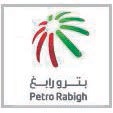
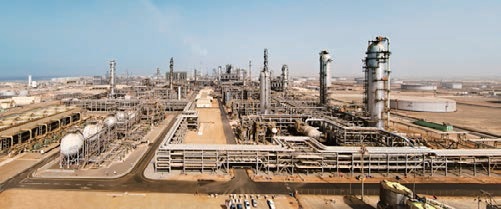
Petro Rabigh’s operates a 400,000-barrel (64,000 m3) capacity refinery located in Rabigh, Saudi Arabia, which produces naphtha, kerosene, gasoline, diesel and fuel oil.
The company held its initial public offering in January 2008. Ownership of the company is 37.5% to Saudi Aramco, 37.5% to Sumitomo Chemical, and 25% to the public. A feasibility study for a second phase for the plant is underway.
Report from the participants in the second day
Mr. Kharid Al-Ghassani, Assistant Secretary General for Culture and Information Affairs of the GCC, pointed out by saying, “Friendships should be formed based on non-interference into internal affairs, territorial integrity and peaceful resolution of conflicts, and the world peace can be pursued from this basic position.” He further stated, “Terrorism cannot be justified for any reasons. The GCC adopted the resolution on cutoff of funding to terrorists, enhanced surveillance of terrorist-dominated area and enhanced surveillance of Daash (ISIS or the Islamic State) in February, 2015.” He expressed his determination to restore peace through “Islamic tolerance and cooperation.”
He also explained that the GCC countries formed a customs alliance as manifestation of reciprocal relationship based on advancement and scientific approach (realization of joint use of ports and harbors), resulting in dramatic increase of trade volume from January, 2008. He explained this using the chart shown below.
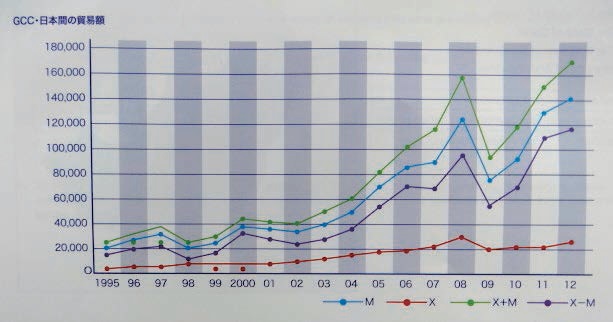
Trade between the GCC and Japan
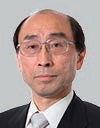
Mr. Shigeru Endo, Special Assistant to the Minister for Foreign Affairs and Ambassador for the GCC and the Gulf Region, welcomed GCC Days conference to be held for the first time in Japan and expressed his gratitude to the GCC member governments and supporters for their efforts on behalf of the Japanese government. He also expressed his gratitude for the assistance from the GCC given to the disaster area struck by the 2011 Great East Japan Earthquakes, saying the GCC friendship and contribution to the recovery of the disaster-affected area would never be forgotten.
Moreover, he pointed out that Japanese Prime Minister Abe’s early visit to all six GCC countries demonstrates the increase of the GCC presence. He stated that the Foreign Ministers’ Meeting in Jiddah in May, 2013 confirmed that coexistence, co-prosperity and tolerance are the basis of stability. He concluded his remarks by projecting a bright future perspective, saying that the relationship between the GCC which does not pursue radicalization and Japan is being elevated to a new height.
(cf. Japanese Ministry of Foreign Affairs Website: http://www.mofa.go.jp/mofaj/kaidan/page4_000069.html)
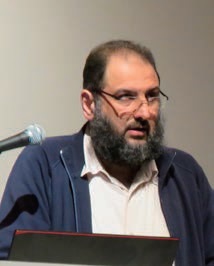
Dr. Al-Katan, Director-General of Religious Affairs Bureau, Ministry of Justice of Bahrain, stated, “Religious sects, ideologies and thoughts are regarded as equal. The Koran teaches that killing one person is equivalent to killing the entire mankind. We should respect and express courtesy to each other. The UNESCO Charter indicates that the respect for humanity beyond races and nationalities is the starting point.” He explained, “The tolerance of Islam is well known at the UN Headquarters in New York. The 2012 Vienna Conference stated that tolerance will eliminate extremism and the Mecca Conference in February, 2015 adopted a resolution to eliminate terrorism.” He testified that the GCC has actively taken countermeasures against Daash and the Emir Sabah of Kuwait was honored as the leader of humanitarian assistance for his promotion of humanitarianism at the United Nations in September, 2014.”
Mr. Hiroshi Sato, senior researcher of JETRO Institute of Developing Economies, explained that Japanese manga and animations are popular among the youth in the GCC, and proposed promotion of overseas education and school trips as direct people-to-people exchanges in the future.
Dr. Namie Tsujikami, Associate Professor of Tokyo University, explained that policies of establishment of new universities, enticement of overseas universities and overseas education in Asia are being promoted as the result of rapid increase of population in the GCC. She pointed out that more than 600 foreign students from Saudi Arabia are currently studying in Japan. Dr. Tsujikami said she herself dispatched female students to Saudi Arabia for short time to let them experience life in Saudi Arabia directly.
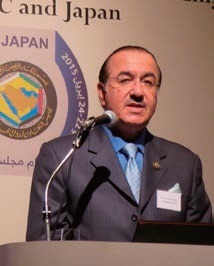
In the final session, Qatar Ambassador Bilal (photo left) stated that “tolerance and compassion” are the common values between the GCC and Japan. In response, Mr. Endo, Japanese Ambassador to the GCC, stated, “As an undercurrent of politics, economy and military, the spirit of harmony and tolerance has played a major role in deepening mutual understanding between the GCC and Japan.”
He also explained that Prime Minister Abe has promoted FTA negotiations, industrial cooperation taskforce, assistance to small and medium enterprises, dispatch of energy conservation experts and peaceful nuclear power agreements with the GCC under the framework of policy dialogues, security dialogues as part of “proactive contribution to peace.” He further emphasized that the GCC is providing Japan with 78% of imported crude oil and 30% of imported natural gas stably thanks to the continued stability of the GCC region.
Lastly, he used charts to explain that PETRORABIGH (See upper diagram below) in Saudi Arabia has been significant as a Japanese foreign policy initiative and suggested that “the GCC is a major market for Japan.” (See lower diagram below) He concluded by expressing his expectation for the future expansion of bilateral exchanges.
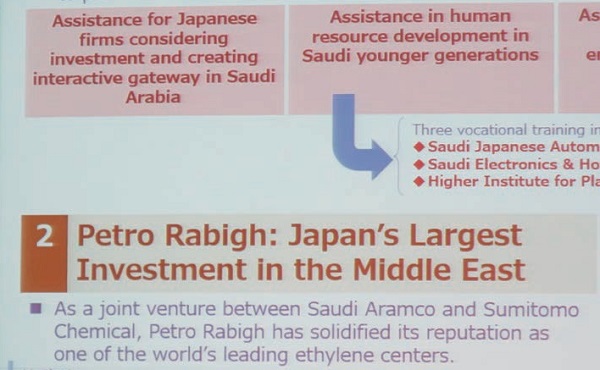
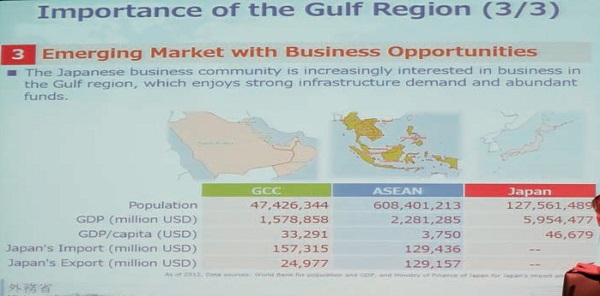
The third day participants’ report
Mr. Kharid Al-Ghassani of the GCC stated the following in his greeting: This is the age of the media. When the media has a strong influence, they will give a good influence if they provide true information based on trust. Otherwise, their influence is dangerous. Islam honors sacrifices, values families and respects people. Nevertheless, comments on Islam that are not true are made sometime. Through this conference, it is hoped that good cooperative relationships are built on the foundation of the past achievement and a new unprecedented level of cooperation is pioneered.
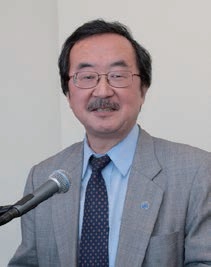
Mr. Kiyotaka Akasaka, President of Foreign Press Center Japan, said he is in the same opinion about the importance of the role the media play. He then pointed out three issues.
1) Not enough information has been disseminated from Japan to erseas.
550 journalist are registered with the Foreign Press Center and work in Japan. 300 are non-Japanese journalists and 250 are Japanese journalists, and all are working for overseas media. There are 80 Chinese, 40 Koreans and 2 journalist (with Al Jazeera, Qatar) from the GCC. There used to be twice as many, but the number halved. On the other hand, there are 600 Japanese foreign correspondents in overseas working for the Japanese media, including 250 in Asia, 150 in North America, 132 in Europe and 45 in The Middle East and Africa. In the GCC countries, there are three correspondents for Asahi, Japan Economic Journal and NHK in Dubai. There are many more In Cairo and they cover the GCC.
The Japanese are eager to send news from overseas to Japan, but not much news reports are transmitted from Japan.
2) The mutual perceptions between the GCC and Japan are not accurate.
According to the Japanese Ministry of Foreign Affairs, the Arab perception of Japan is favorable. This may be because there is no negative historical liability. In the past, many Arabs became pro-Japan through industrial cooperation with Japan. In recent years, Japanese manga, anime films and popular culture are popular among Arabs.
On the other hand, the Japanese perception of the GCC is fragmented. For example, the images of Dubai in Japan are a rich country with oil money, wealthy people who live in luxurious condominiums, high-rising buildings, a country of dream, etc. More recently, the extremist groups such as the Islamic State are negatively affecting the GCC images in Japan.
3) There are many areas in which the media in Japan and the GCC can cooperate.
First of all, I want to propose regular dialogues between the Japanese and GCC media. The Japanese media should make efforts to promote correct understanding of Islam through NHK and other television programs.
The GCC media should transmit information (such as the GCC perception of extremism and the Islamic State) to Japan.
In the future, the Japanese media should leverage opportunities such as 2020 World Fair in Dubai and 2022 World Cup in Qatar.
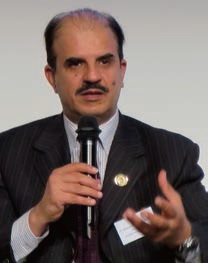
Dr. Abudulaziz bin Saleh bin Salamah, Deputy Minister for Foregn Information (Saudi Arabia) briefly explained the following:
NHK bureau was established in Dubai in 2010. Yomiuri and Sankei opened their bureaus in Cairo. In Saudi Arabia, Fuji TV and TV Tokyo correspondents arrived and they are trying to convey people’s life and culture in the GCC.
Al Jazeera broadcasts a documentary on the Japanese culture in Arabic language with good results. MBC is also broadcasting an interesting program on Japan. However, people’s view on Japan is heavily influenced by the American and European perception of Japan.
Dr. Salamar forcefully stated, “The victims of Daash are us. We are inconvenienced. Our society is united against Daash and 40 countries are fighting against them. That is reality.”
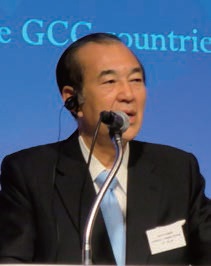
Mr. Masayuki Yamauchi, Professor Emeritus of the University of Tokyo complained about the Japanese media reports.He pointed out the following facts.
- The humanitarian assistance was reported in the GCC, but not in Japan.
- When two Japanese hostages were killed by Daash in January, 2015, NHK broadcast a comment which stated “There are good reasons why Japan is viewed as an enemy” on January 24. Such comment is interpreted as saying Daash can be considered to be an independent
nation.
- The pillar of Japan’s foreign policy is non-military assistance or humanitarian assistance. The Japanese media interpreted this as a military rear-area (logistics) support. This is not correct.
- Some Japanese media stated that humanitarian assistance to Syria and Jordan is connected to Daash’s killing of the Japanese hostages. This is misunderstanding of the fact.
Jordan’s population is 6.3 million and Jordan is an important country for Japan. 400,000 Iraqi refugees and 700,000 Syrian refugees entered Jordan. The growth of Jordan’s GDP slowed down from 5.5% growth rate in 2009 to 2.8% in 2013. The foreign direct investment including investment from the GCC decreased from 23.5% growth rate in 2006 to 4.0% in 2013. The decrease was caused by the deterioration of the investment condition due to the civil war in Syria and Iraq. The employment rate is declining and the current youth unemployment rate is 32%.
Japan’s economic assistance to Jordan has been continuing since 2010 when the Democratic Party of Japan was in power. - The Japanese media apparently did not analyze the contents of 200 million dollar humanitarian assistance announced by Prime Minister Abe. Some media commented that the assistance provoked Daash.
However, 200 million dollar assistance included (1) delivery of water and foods to refugees, (2) improvement of temporary houses, and (3) education and vocational trainings. The recipients of assistance are Jordan (28 million dollars), Syria (33 million dollars), Iraq (90 million dollars), Lebanon (18.2 million dollars), Turkey (15.3 million dollars), and Egypt (4 million dollars). Those assistance money cannot be spent freely and is cannot be diverted for military use. I want the media to report such contents of the assistance.
Japan is good at non-military, humanitarian assistance. This is the backbone of Japan’s Middle East foreign policy in the spirit of proactive contribution to peace.
Lastly, he commented on the Japanese media’s involvement in the Middle East. He concluded by saying, “The Middle East loves Japan. They don’t dislike Japan. They don’t hate Japan. Nevertheless, it is not possible for Japan to be loved by terrorists. Some people expressed opinions that the Arab’s general perception of Japan in the Middle East has changed through terrorist killing of the Japanese citizens in Algeria and Daash’s killing of the Japanese hostages. Such view does not represent voices of conscientious Arab citizens in the Middle East including the GCC.”
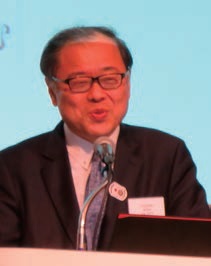
Mr. Toshihiro Nakanishi, Senior Staff Writer, Nikkei Inc. stated: I have studied Arabic since I was 18 years old and lived in the Middle East and the Islamic world. Why do foreign media including the Japanese media generate negative reports? Aren’t terrorism and wars exaggerated too many times?
He mentioned about the GCC as an example and expressed his feelings about distorted media reports frankly: The Gulf countries went through many crises including Nasser period, Iran-Iraq War, Gulf War, Iraq War and Arab Spring. At each crisis, the Gulf countries got united and maintained a king’s reign and an emirate. I wonder if foreign media really understand this.
Mr. Shin Nimura, Senior Commentator, Japan Broadcasting Corporationo (NHK) showed 14-minute video (photo below) which was co-produced by NHK and Al Jazeera and broadcast in March, 2011. NHK broadcast the exactly same video as “Children’s Great Scientific Experiments” (Hand-made battery with orange juice), and Al Jazeera produced a program on the same experiment in Arabic and broadcast it. His presentation showed the bright future potential of the media cooperation.
His presentation showed the bright future potential of the media cooperation.
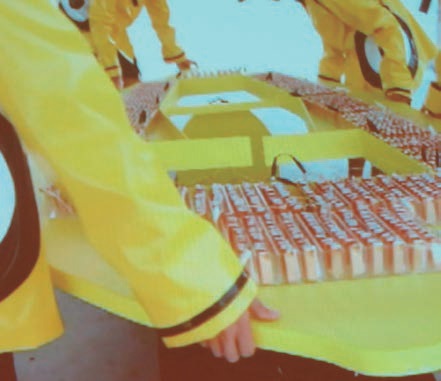
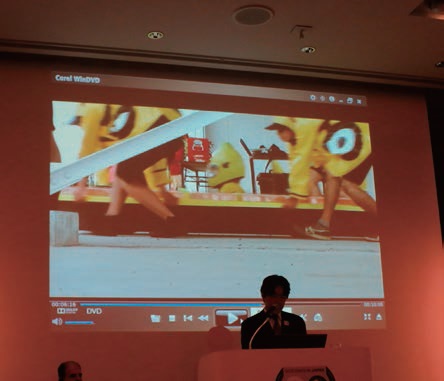
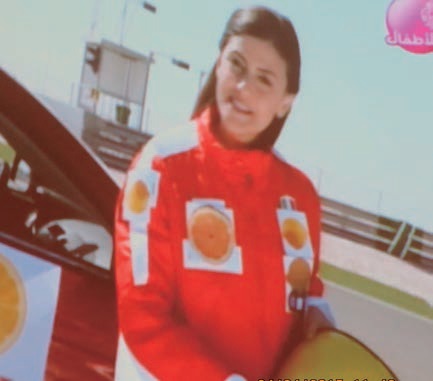
More articles available in the electronic “Salaam Quarterly Bulletin”, No.14, May 2015.
